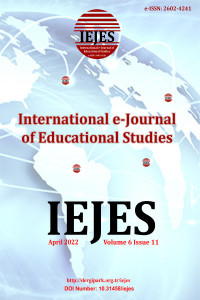The Role of Stakeholders in The Makassar Tidak Rantasa’ Program: Knowledge and Public Participation
The role of stakeholders, Knowledge, Public paticipation
The Role of Stakeholders in The Makassar Tidak Rantasa’ Program: Knowledge and Public Participation
the role of stakeholders, knowledge, public participation,
___
- Anggriawan, N. (2014). Participation and social participation. Clinical Rehabilitation, 3(4), 77–98.
- Badan arsip. (2014). Gerakan Makassarta Tidak Rantasa. Perpustakaan dan Pengolahan Data Kota Makassar: Makassar.
- Bashir, M. J. K., Tao, G. H., S, A. A. S., Tan, K. W., Engineering, F., Technology, G.,Perak, K. (2018). Public concerns and behaviors towards solid waste minimization using composting in kampar district , Malaysia. Global NestJournal, 20(2), 316–323.
- Berger, M., & Goldfarb, J. L. (2017). Understanding our energy footprint: undergraduate chemistry laboratory investigation of environmental impacts of solid fossil fuel wastes. Journal of Chemical Education, 4(3), 77–89. https://doi.org/10.1021/acs.jchemed.7b00104
- Bryson, J. M. (2004). What to do when stakeholders matter: stakeholder identification and analysis techniques. Public management review, 6(1), 21-53.
- Chandra, H. P., Indarto, I., Wiguna, I. P. A., & Kaming, P. F. (2011). Impact of stakeholder psychological empowerment on project success. IPTEK the Journal for Technology and Science, 22(2).
- Kendal, S., & Widodo, S. (2018). Community participation in the implementation of constitutional laws through the village tourism development in tanjungsari county rowosari. Journal of Social Science Studies, 5(1), 184–197. https://doi.org/10.5296/jsss.v5i1.12016
- Okioga, C. K. (2013). The impact of students ’ socio -economic background on academic performance in universities , a case of students in kisii university college. Journal of Human Movement Studies, 2(2), 38–46.
- Manzoor, S., Shah, H., & Saleem, S. (2019). Journal of arts & humanities relationship with their academic achievement. Journal Humaniora Education, 3(4), 77–79.
- Rajaratenam, Sri Ganesh, Rose Dinda Martini, Nur Indrawati Lipoeto. (2014). Hubungan Pengetahuan dan Sikap dengan Tindakan Pencegahan Osteoporosis pada Wanita Usila di Kelurahan Jati, Jurnal Kesehatan Andalas, 3(2)
- Sugiyono, D. R. (2018). Statistika untuk penelitian. Bandung: CV. Alfabeta.
- Tangkudung, James AP, (2016). Macam-macam metodologi penelitian uraian dan contohnya Jakarta: Lensa Media Pustaka.
- Tartari, E. (2015). The use of social media for academic purposes in student ’ learning process. Academic Journal Interdisiplinary Studies, 4(2), 393–398.
- Wibisono, N. (2017). Public participation on village funds monitoring in madiun Madiun Regency, Indonesia. Developing Coutry Studies, 7(10), 124–129.
- Widiyanti, A., & Airlangga, U. (2017). Implementation of local participation as part of good governance principles : Galengdowo Village Wonosalam. Jurnal Akuntansi Dan Keuangan, 19(2), 59–66. https://doi.org/10.9744/jak.19.2.59-66
- Widiyanto, A. F., Alifah, N., Murniati, T., Pratiwi, O. C., Health, P., & Sciences, H. (2019). Knowledge and practice in household waste management pengetahuan dan praktik dalam pengolahan sampah rumah tangga. Journal Health Public, 13(3), 112–116.
- Başlangıç: 2017
- Yayıncı: Tamer KUTLUCA
Policy Evaluation of Child-Friendly Schools in Depok City; Indonesia
Jasra PUTRA, Eliana SARİ, Makruf AKBAR
Andi SAPARİA, Firmansyah DLIS, Achmad Sofyan HANIF
Thinking Styles of New Mathematics Teachers and Their Relation to Self-Esteem
Thurayah THURAYAH, Sylviana MURNİ, Suparno Eko WIDODO
Agung Surya DWİANTO, R. Madhakomala R. MADHAKOMALA, Hamidah HAMİDAH
Mindfulness: Views of Turkish Pre- Service Early Childhood Teachers
Funda Eda TONGA, Feyza TANTEKİN ERDEN
The Role of Stakeholders in The Makassar Tidak Rantasa’ Program: Knowledge and Public Participation
